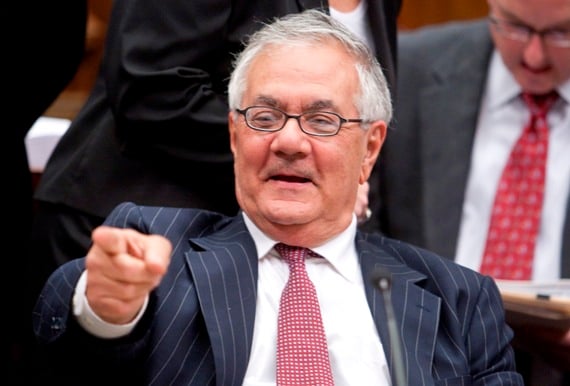Dodd-Frank co-author sends letter to commission not to foist 1940 law onto broker-dealers
The leading congressional proponent for requiring broker-dealers to adhere to a fiduciary duty is reminding the SEC not to undermine their business practices as it considers a universal standard of care.
In a May 31 letter, Rep. Barney Frank, D-Mass., ranking member of the House Financial Services Committee, reiterated that the Dodd-Frank financial reform law gives the Securities and Exchange Commission the authority to impose a fiduciary duty on broker-dealers that is “no less stringent” than what is required of investment advisers under the 1940 Investment Advisers Act.
Mr. Frank, however, wrote in the letter that SEC Chairman Mary Schapiro should be careful in interpreting the “no less stringent” guidance and to avoid foisting the 1940 law onto broker-dealers.
The letter was included in today's Davis Polk Regulatory Tracker.
“If Congress intended the SEC to simply copy the '40 Act and apply it to broker-dealers, it would have simply repealed the broker-dealer exemption — an approach Congress considered but rejected,” Mr. Frank wrote. “The new standard contemplated by Congress is intended to recognize and appropriately adapt to the differences between broker-dealers and registered investment advisors.”
The language of Mr. Frank's letter echoes points that broker-dealers have made throughout the debate over financial reform and during the implementation of the Dodd-Frank law. Although many broker organizations have expressed support for a universal fiduciary duty, they have warned that it should be carefully implemented to avoid roiling the broker-dealer business model.
“The broker-dealer community will use [Mr. Frank's] letter to support their arguments,” said David Tittsworth, executive director of the Investment Adviser Association. “But I'm not sure this adds much to the debate.”
SEC spokesman John Nester declined to comment directly on Mr. Frank's letter. "The staff's goal is to draft a meaningful, pro-investor fiduciary standard that is business-model neutral and does not limit investor choice," Mr. Nester said in an email.
The Securities Industry and Financial Markets Association declined to comment on Mr. Frank's letter. Mr. Frank was not immediately available for comment.
Barbara Roper, director of investor protection at the Consumer Federation of America, has allied with Mr. Frank in advocating universal fiduciary duty. She doesn't interpret Mr. Frank's message as indicating that he wants to rein in the SEC.
“In light of his record, I doubt this letter is intended to warn the agency against going too far, particularly since the SEC has made clear it has no intention of taking the approach he warns against,” Ms. Roper wrote in an e-mail.
The Dodd-Frank law already stipulates that charging a commission, selling propriety products and offering a limited menu of products does not necessarily breach fiduciary duty. It also says that broker-dealers would not have a continuing obligation to clients after a sale.
Currently, investment advisers have a fiduciary duty to their clients, meaning they have to act in clients' best interests. Brokers must meet a less stringent suitability standard, which requires that they offer products that are appropriate for a client's investment needs, timeline and risk appetite.
The SEC submitted a study to Congress in January that recommended that the agency promulgate a universal fiduciary duty in order to protect investors who are confused about the differing advice standards.
But the two SEC Republican commissioners — Kathleen Casey and Troy Paredes — issued a dissent to the report, saying that it lacks sufficient economic analysis to support its conclusion. Capitol Hill Republicans have asked the SEC not to proceed with a fiduciary-duty rule until it does more work on its costs and benefits.
The House Financial Services Committee is expected to hold a hearing on the fiduciary-duty report in July. The SEC has said it will not move on a fiduciary-duty rule until later this year.
The hearing will give lawmakers their first chance in this session of Congress to comment on fiduciary duty in an official forum. Mr. Frank may have sent his letter to the SEC in order to clear the air beforehand, Mr. Tittsworth speculated.
“He feels like there's chatter out there about what [Section] 913 [of the Dodd-Frank law] may or may not mean,” Mr. Tittsworth said. “He's trying to provide helpful guidance.”







